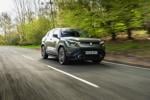Police officers have been warned they must drive bluelight vehicles as though they were private cars to ensure they are not prosecuted for careless or dangerous driving.
The Police Federation of England and Wales has issued the advice amid concerns over the lack of protection the law currently gives them.
It says legislation leaves police drivers vulnerable and it is, effectively, illegal to engage in pursuit or response drives.
Under existing law, emergency service workers are only permitted to ignore traffic signs and speed limits, something the federation believes offers insufficient safeguards during emergency call-outs.
The traffic sign ruling is void if there is any element of risk to the public, and the speed limit safeguard does not stop charges of careless driving being brought.
The federation says it has been highlighting the issue to politicians for years to no avail and has now written to forces with a warning about on-road risk management.
Federation board member Tim Rogers said in a letter that legal advice shows that police response and pursuit drives are, in most circumstances, highly likely to fall within the definitions of careless or dangerous driving.
There are no exemptions to the offences of careless or dangerous driving to allow emergency driving and experts believe drivers are highly likely to fall outside the law as it is drafted.
Rogers said: “Driving involving contravention of traffic signs and speed limits is likely to fall within the definition of careless or dangerous driving.
“Officers are required by law to drive to the standard of the careful and competent driver. Not the careful and competent police driver, the careful and competent (non-police) driver. This is the standard police drivers will be held to.
“There are no legal exemptions from the offences of careless or dangerous driving. Any such drives are therefore likely to be unlawful, placing the driver at risk of prosecution.”
The federation is warning officers to “drive in a way which is lawful and does not contravene the laws of dangerous or careless driving”.
Rogers added: “Officers are advised not to undertake any manoeuvre which may well fall outside the standard of the careful and competent non-police driver.”
The advice follows the Independent Police Complaints Commission (IPCC) recently directing a force to bring proceedings against an officer for gross misconduct for careless driving.
Another example from 2012 involved a patrol officer who was charged with dangerous driving after pursuing a stolen van.
The charges by the Crown Prosecution Service (CPS) came following a review by the Hampshire Constabulary. No complaints were made about his driving and no members of the public were injured in the pursuit. The case made it to trial, where a jury cleared the PC within two hours.
Both the CPS and the force received criticism from the local police federation, saying the officer had been through “12 months of hell” after being prosecuted for “just doing his job”.
Police fleet managers have an important role in ensuring officers are provided with vehicles that are procured, allocated and maintained to be fit for purpose, according to John Gorton, head of transport for Kent and Essex Police.
“The officers who drive under response conditions are highly trained; this includes the ability to dynamically risk assess the circumstances of anything they may need to deal with,” he added.
The debate about bluelight driving comes as the IPCC published new figures showing there were 32 road fatalities during or following police contact in England and Wales for 2016/17, a rise of 11 year-on-year.
Jason Wakeford, spokesman for road safety charity Brake, said: “The sharp increase in pursuit-related deaths is deeply worrying and underlines the fact that police chases, often at excessive speed, are incredibly dangerous.”
Although the IPCC is a key factor behind police drivers being assessed as responsible for careless or dangerous driving, the issue is relevant to drivers of ambulances and fire engines, too.
Rogers added: “The fire service, through the Fire Brigades Union, is aware of the issues and has this campaign on its priority agenda for 2017-2018. The ambulance service, being represented by a number of unions, has yet to take this forward.”


















Anarchy in the UK - 06/09/2017 10:59
How many "blue light" accidents are caused by other (in)competent drivers not paying attention? Sounds like a criminal free-for-all as we head towards anarchy on the roads which cannot be policed by cameras alone. Just give a false address when you buy a car and you'll get away with pretty much any motoring offence as the ANPR triggered letters pile up in somebody else's hallway. If the emergency services have to abide by all the rules on our congested roads, how many people will die waiting for an ambulance or fire engine? You couldn't make it up.